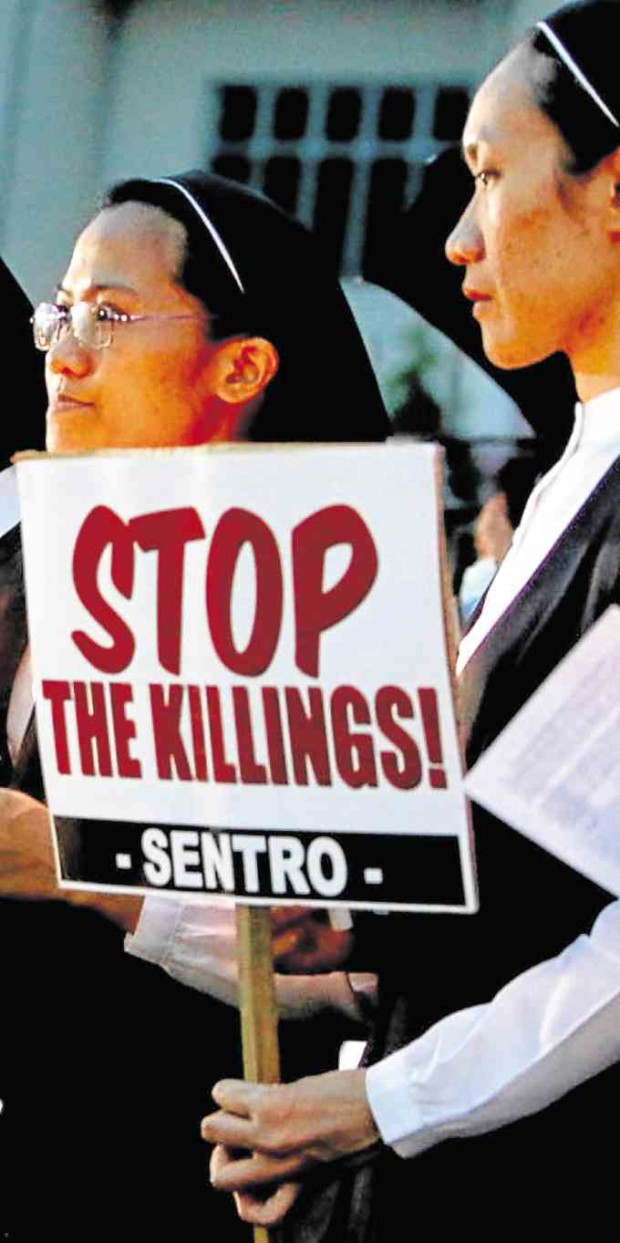Gov’t ordered to yield PNP’s voluminous records on drug deaths

Nuns join a rally in Quezon City demanding a stop
to extrajudicial killings of drug suspects. The growing list of victims of those killings now include Joselito Pasaporte, a youth environment group member. —RICHARD REYES
The Supreme Court has ordered the government to submit its records on the thousands of persons killed under its war on drugs.
During the third and final session of the oral argument, the high court ordered the submission of the following for those 3,806 killed under legitimate police operations from July 1, 2016 to Nov. 30, 2017:
-names, addresses, gender of those killed
-place, date and time of drug operations
-names of PNP team leader and team members who participated in the operation
-the pre-operation plan
-the post operation report
-whether search warrants or warrants of arrests were issued
-names of representatives of media, NGOs and barangay officials present during the police operations
Solicitor General Jose Calida pointed out that the two petitions against the government’s war on drugs involved less than 50 deaths.
“I am not talking about the incidents in the petition. The records must be there since they are legitimate operations,” Senior Associate Justice Antonio Carpio said.
On those death under investigation, the high court asked the submission of the following:
-names, addresses, gender, ages of those killed
-date, time and place of the killing
-Scene Of the Crime Operatives (SOCO) team leader and members who investigated the killing
-investigation reports
-charges have been filed against the suspects if there are any
“You must know them because you are investigating them,” Carpio said.
Associate Justice Alfredo Benjamin Caguioa, on the other hand, asked the government lawyers to submit the records of all buy-bust operations conducted in San Andres Bukid, the subject of one of the two petitions, the pre-operations plan and post operations plan.
Given the voluminous document that the government needed to submit, the high court granted the request of the Solicitor General that they be given two months to comply.
The oral argument was in connection with the two consolidated petitions filed by the Center for International Law (CenterLaw) through lawyer Joel Butuyan on behalf of the residents of 26 barangays in San Andres Bukid, Manila City and the Free Legal Assistance Group (FLAG) led by lawyer Jose Manuel Diokno.
The CenterLaw petition is seeking the issuance of a writ of amparo to shield the residents of 26 barangays in San Andres Bukid, Manila City against the government’s anti-illegal drug war.
The FLAG petition, on the other hand, is seeking to declare as unconstitutional PNP’s CMC 16-2016, or “Oplan Double Barrel,” which Diokno said allows the police to neutralize suspected drug pushers.
The group also filed the petition for the SC to issue protection orders for the relatives of three persons who ended up as victims of “extralegal killings” in the drug campaign.
Diokno said that the killings of Ryan Dave Almora and Rex Aparri and the shooting of Jefferson Soriano are part of “extralegal killings,” thus covered by the rule on the writ of amparo.
CMC No. 16-2016 has five stages, namely: the collection and validation of information stage where information on suspected drug users and pushers is acquired and verified through a five-tier validation process; the coordination stage with LGUs, PDEA, DDB, the Anti- Drug Abuse Councils, the Philippine Information Agency and NGOs; the house-to-house visitation stage; the processing and documentation stage where the voluntary surrender form is accomplished and the person- of-interest is interviewed; and the monitoring and evaluation stage where police action is taken in case of continued drug activities.